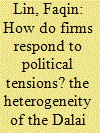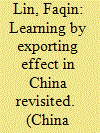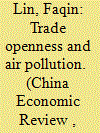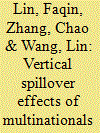| Srl | Item |
| 1 |
ID:
170088


|
|
|
|
|
| Summary/Abstract |
Little is known about the firm-level dynamics behind trade responses to political tensions. This article reinvestigates variation in the travel pattern of the 14th Dalai Lama to study how political tensions affect trading decisions of Chinese importers. Using monthly trade data from China Customs covering imports of machinery and transport equipment from 173 countries over the 2000–2006 period, our empirical results show a significant reduction of imports in response to foreign government members' meetings with the Dalai Lama. In line with the idea that Chinese importers face a trade-off between bearing costs from suboptimal trade transactions and costs from not accommodating the government, this ‘Dalai Lama Effect’ operates at the intensive margin, i.e., via a decrease in the import volume per importer. Examining differential effects across types of firm ownership, we find that the observed effect is driven by state-owned enterprises (and foreign-invested firms) and not by private companies. Moreover, while direct importers temporarily reduce their trade with Dalai Lama-receiving countries, there is some evidence that trade intermediaries fill the void. Overall, we find the effects to be much more short-lived than previously thought.
|
|
|
|
|
|
|
|
|
|
|
|
|
|
|
|
| 2 |
ID:
105075


|
|
|
|
|
| Publication |
2011.
|
| Summary/Abstract |
This paper investigates the relationship between labor quality and inward foreign direct investment (FDI) distribution in China using a large sample of Chinese cross-sectional, firm-level data, with comprehensive information about labor quality. The paper finds that labor quality measured by education level plays an important role in deciding the distribution of inward FDI, but labor quality measured by working certificates loses its significance using non-parametric matching techniques and the instrumental variables and generalized method of moments technique. The author also finds that labor quality has a more significant impact on other foreign investments than Hong Kong-invested, Macau-invested and Taiwan-invested firms. The impacts of labor quality on inward FDI are found to be strongly uneven across industries and provinces. Therefore, China should pay more attention to the education of employees in all foreign-invested firms, and invest more in education to improve labor quality, which will help China to attract more FDI, especially technology-intensive FDI.
|
|
|
|
|
|
|
|
|
|
|
|
|
|
|
|
| 3 |
ID:
143357


|
|
|
|
|
| Summary/Abstract |
Does exporting increase the firm’s productivity causally? Focusing on Chinese exporters over the period 1998-2007, we construct a new measure of firm-specific trade cost, based on the daily Baltic Dry Index (BDI), as an instrument of exports. The BDI is termed a leading trade cost indicator, reflecting the cost of utilizing dry bulk carriers which primarily consists of materials that function as raw material inputs to the production of finished goods. We find that a one percentage point expansion in exports raises firm total factor productivity by approximately 0.04 percentage point on average, which accounts for nearly 60 percent growth of the exporter’s productivity over the period 1999-2007
|
|
|
|
|
|
|
|
|
|
|
|
|
|
|
|
| 4 |
ID:
156459


|
|
|
|
|
| Summary/Abstract |
We seek to contribute to the debate over trade openness and the environment by taking specific account of the endogeneity of trade openness. We use exogenous geographic determinants of trade as instrumental variables as well as distance to Huai River for identification which is based on China's heating policy. Using air quality measure from NASA, we find that trade increases three measures of air pollution: SO2, NO2, and Aerosol concentration.
|
|
|
|
|
|
|
|
|
|
|
|
|
|
|
|
| 5 |
ID:
125027


|
|
|
|
|
| Publication |
2012.
|
| Summary/Abstract |
Foreign direct investment (FDI) can benefit domestic firms in the host country. Using firm-level data for China, we find statistically positive vertical spillover effects of multinational enterprises on the performance of domestic firms through backward and forward supplier-customer relationships. The spillover effects are mainly from large multinational enterprises and are greater for state-owned firms and in poor regions. Our results are robust for both parametric regression and nonparametric matching techniques. Our findings have strong policy implications: while regulations relating to building business relationships with domestic firms when seeking foreign direct investment should be established, such policies should be aimed at private firms, big multinationals and less developed regions.
|
|
|
|
|
|
|
|
|
|
|
|
|
|
|
|